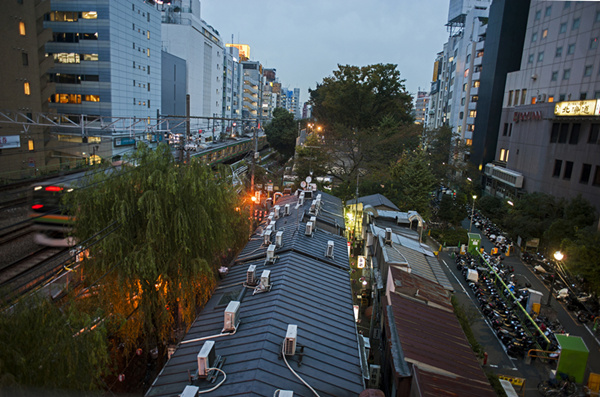Revisiting Tokyo
By Amy Chozick ( Agencies ) Updated: 2015-03-07 07:56:50
 |
|
A bird's-eye view of Nonbei Yokocho. [Photo/Agencies] |
We followed them as they pushed their tiny collapsible bicycles through the streets of Shinjuku to the Albatross G, a compact three-story saloon with blood-red walls, and one of hundreds of tiny bars squeezed into Golden Gai, a hodgepodge of alleyways, some only wide enough for a single person. Many of these shanty-style bars were used as brothels until the late 1950s, when prostitution was banned.
Ken had explained all this to me when we went to Golden Gai on my first disorienting night in Japan. He also told me that his mother is a geisha, which I had assumed was a joke played on the naive foreigner.
"Yeah, right, and your dad is a samurai," I responded. But his mother really is a geisha, I later learned. We once went to watch her perform a fan dance in full kimono in the resort town of Atami, where John Wayne is said to have relaxed while filming the 1958 movie "The Barbarian and the Geisha."
We continued our night with Ken not far from the Albatross G at Omoide Yokocho (which, depending on whom you ask, is known in English as Memory Lane or Piss Alley), an alley lined with closet-size yakitori restaurants. I ordered a Hoppy, a beer-flavored drink popular with Japan's working class that makes for the perfect complement to the pork belly and chicken ball skewers.
I love to shop, but I gave it up in Japan after a saleswoman at the Shibuya 109 department store, a cylindrical silver tower that caters to tan teenage girls in knee-high hose, politely handed me pants in a size XXL. They wouldn't button. (I am a size 6 in the United States.) From then on, the money I saved on clothes I spent at Kyubey, a delicate Edo-style sushi bar where the omakase, or set course for two, costs around $500.
I was led there by my foodie friend Yukari Iwatani Kane, a journalist and author who picked up where Ken left off, introducing me to Tokyo's most delectable restaurants. We took in a meal at the original Ginza location that forever altered my perception of what raw fish can taste like.
Most Americans head to Sukiyabashi Jiro, the Michelin-starred sushi bar in the Ginza Metro station that was featured in the 2011 documentary "Jiro Dreams of Sushi." But the service can be brusque, which is at odds with the art of the sushi chef and the friendly, but respectful, rapport he develops with customers.
|
|
|
|
|
|
|
|

























 Raymond Zhou:
Raymond Zhou: Pauline D Loh:
Pauline D Loh: Hot Pot
Hot Pot Eco China
Eco China China Dream
China Dream China Face
China Face






